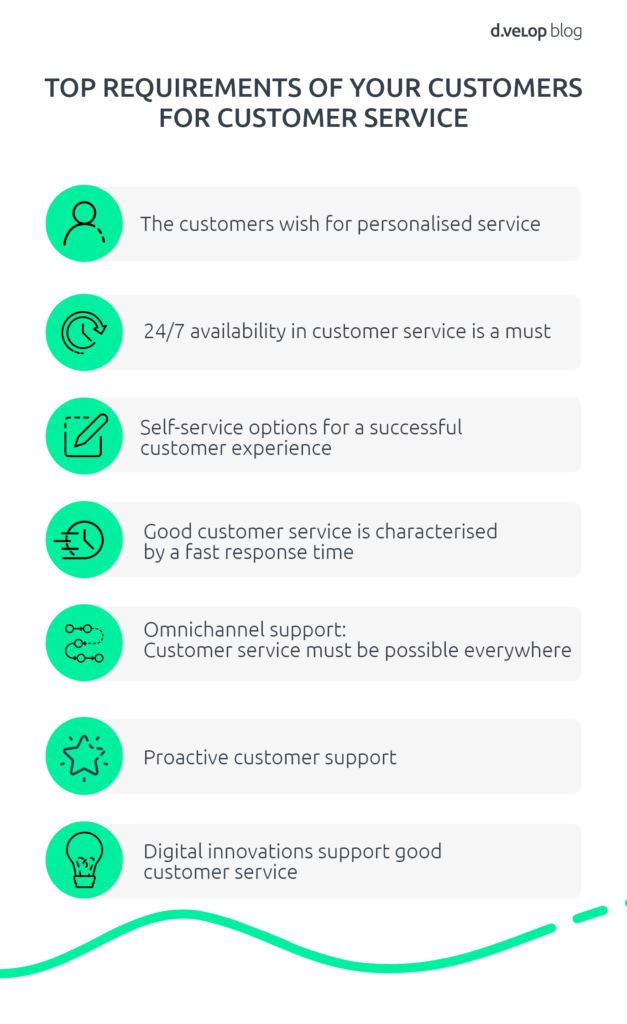In this article, we will focus on customer experience and customer service.
Even if the sales process was long and difficult, the real challenge begins once the deal is signed. Winning a customer is one thing but satisfying the customer in the long term is another story. Loyalty is primarily achieved through great customer service and customer experience. According to a study by Dimension Data, companies worldwide are failing to implement effective digital customer service experience strategies.
Customer service determines success or failure
In Microsoft’s “State of Global Customer Service Report,” it was found that 61% of the companies surveyed had ended partnerships due to poor customer service. In addition, for those surveyed, the most important aspect of good customer service is that the problem is solved in a single interaction. They expect quality, regardless of the input channel. Customers expect to receive help via an omni-channel approach, (phone, email, or social media) with the same high standards at all times.
According to a study by Salesforce, 80% of customers say that the experience a company provides is just as important as the products and services themselves. Customers expect not only good products but also, a first-class experience when dealing with their suppliers.
What is good customer service, and what does an excellent customer experience look like?
High satisfaction with a company’s products, does not immediately translate into equally high loyalty. As the report indicates, a customer may be enthusiastic about your products or services, but a competitor could still lure that customer away from your company with a better overall package.
But what does customer service actually mean? Simply, quality customer service confirms the confidence placed by your customer when they purchase from you. It is the critical part of the relationship, establishing trust, setting expectations and creating the long-term value of the partnership.
The top requirements of your customers for customer service

Customers wish for personalised service
Even though we always speak abstractly about “the customers,” ultimately people buy from people. Those who make the purchase decisions want to be recognised in their individuality and treated accordingly. Consequently, it is expected to have a personalised experience in every interaction that includes the agent’s knowledge of contact information, preferences, purchase and contact history. This information can be found in the CRM and must be organised and readily available. This significantly contributes to customer loyalty, whilst enabling your employee’s customer interaction to be far more efficient and rewarding. Poor customer engagement systems are often stated as a key reason for employees to leave a company.
24/7 availability in customer service is a must
Globalisation has changed the demands put upon customer service. Our clients expect a first-class service whatever time zone or mode (home or office) they operate within. Providing the appropriate systems, processes and communication mediums are critical to achieving quality levels of service.
Self-service options for a successful customer experience
Self-service customer portals are becoming increasingly popular. 90% of respondents in a study commissioned by Microsoft expect companies to offer an online customer portal.
Customers can enjoy the convenience of chatbots, community forums, help centers, FAQs, without having to contact customer service for every question. However, the quality of the self-service option is critical. If customers are unable to solve their problems themselves, (availability of insufficient online quality information, poor design or the search facilities of the site), the benefits of self-service are completely lost and will detract from the overall Customer Experience.
The benefit of an excellent self-service portal is two-fold. It makes your customer happy, improving customer loyalty and subsequently, relieves service employees from low level enquiries. Providing time for the more challenging issues, resulting in a higher quality resolution rate, offering greater customer service and resulting in enhanced Net Promoter Scores (NPS).
Good customer service is characterised by a fast response time
When we talk about customer experience, speed is an absolute key factor for a great experience.
To be able to quickly respond to requests, digital innovations, self-service portals, combined with sufficiently highly qualified employees are critical. The experience for the customer stands and falls with the employees. Therefore, it must be ensured that employees have the resources and knowledge to deliver quick and accurate answers.
Omnichannel support: Customer service must be possible everywhere
In addition to the already described requirements, customers want the option to contact companies through their preferred channel. The channel choice varies greatly between generations and the complexity of the problem. Therefore, it is essential that a company is able to communicate via email, live chat, social media, phone, etc., to solve customer problems.
It is critical that these channels do not operate independently of each other. A deep network and a shared data pool are a must! For example, a conversation from live chat can be moved to the phone if it contributes to solving the problem. Previous email correspondence or case notes must be available as a core knowledge base, ensuring that the customer does not need to explain their problem again.
To ensure this customer experience, all communication channels should be seamlessly integrated on one platform, allowing full collaboration between service agents and associated departments
Proactive customer support
Every company collects vast amounts of data from its customers and evaluates them according to various criteria. The value of this data is exceptional and should be treated as gold dust.
To build proactive support, companies must initiate a comprehensive data capture and analysis program. The benefits of this process allow companies to understand in detail, product issues, successes, developing trends, ensuring that a proactive culture is established. A proactive culture can address potential customer problems before they arise, reducing wasted support resource, whilst building customer advocacy. By going the extra mile for your customers, it will result in exceptional customer experience.
Digital innovations support good customer service
Finally, companies should start to engage with digital innovations to help them create an unforgettable experience for their customers in every interaction. You can be assured, your competitors are!
To do this, you should evaluate which innovations will offer added value to your customers. These include big data to analyse the needs and behaviour of your customers or for example, AI chatbots for quick help with minor problems. Virtual reality applications for physical stores or augmented reality for remote troubleshooting, can also be valuable innovations for your customers.
Salesforce helps boost customer service
How can companies establish good omni-channel customer service and develop long term loyalty and advocacy? How can information be provided to customers without great effort? Salesforce offers the Service Cloud to meet the customer’s need for such digital service processes, supporting companies that have made great customer service their goal.
An example could be as follows: A customer calls the service team with a problem by phone. Thanks to CTI integration, the caller’s number is directly assigned to their account and the calling person is immediately identified. The agent can then greet the customer personably, by name, identify customer’s issue and if not able to resolve immediately, can open a new case.
The service employee operates as usual in the Salesforce Lightning environment and can thus work intuitively, comfortably and with a 360-degree view of the customer. The agent now has access to all previous cases, purchased products and contact history in order to be able to fully take care of the customer – the foundation of a successful customer experience. With “d.velop documents connect for Salesforce” and the included document viewer, important documents such as the valid SLA or the customer’s contract can be displayed directly on the case. Automated processes such as (macros) or pre-built workflows, provide the agent with fast and efficient tools, reducing delay and enhancing the customer experience. If the employee cannot immediately find a solution, the case can be directly transferred to a colleague with the appropriate expertise. Alternatively, internal consultation can be held with colleagues via the Chatter function.
Documents or emails are stored directly within Salesforce in the document management system at each step. This way, every employee has access to revision-proof documents in the future and can track the history. This reduces frustration for both employees and customers, further developing trust, the customer relationship and ongoing advocacy.
Top 3 take-aways for proper Customer Service
- Personalised customer service is the key factor for customer loyalty.
- Self-service is growing rapidly. That said, service employees with high expertise are more important than ever for good customer experience.
- Customer demands drive digital experiences. Companies must constantly adapt and adjust to them.
